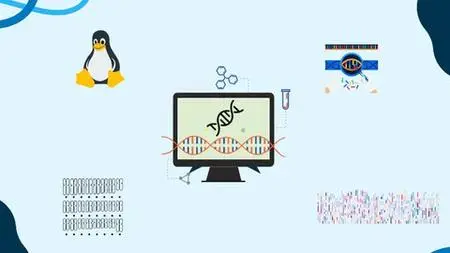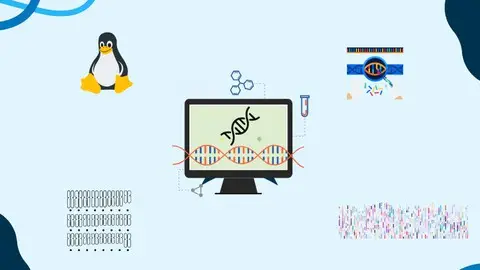Comprehensive Bioinformatics: Learn Genomics Data Analysis
Published 12/2023
MP4 | Video: h264, 1920x1080 | Audio: AAC, 44.1 KHz
Language: English | Size: 5.22 GB | Duration: 8h 36m
Published 12/2023
MP4 | Video: h264, 1920x1080 | Audio: AAC, 44.1 KHz
Language: English | Size: 5.22 GB | Duration: 8h 36m
Unlocking Genomic Data Analysis Mysteries through Practical Bioinformatics Applications for Research Purpose
What you'll learn
Understand Genomic Fundamentals
Sequence Alignment
Genome Annotation Analysis
Gene Structure Analysis
Variant Calling
Gene Location on chromosome
Transcriptomics
Proteomics
Phylogenetics
Functional Genomics
Bioinformatics Tools for Genomic Analysis
Practical Genomics Data Analysis
Research-oriented Bioinformatics Techniques
Genomic Sequencing and Coding
Transcriptomics Data analysis
Requirements
Basic Biological Knowledge
Curiosity and Enthusiasm
Computer Literacy
Description
Embark on a transformative journey into the fascinating realm of genomics and bioinformatics with our course, "Comprehensive Bioinformatics: Learning Genomics Data Analysis." This comprehensive program is meticulously crafted to empower learners with the knowledge and skills essential for unlocking the secrets encoded in the DNA of living organisms.What You Will Learn:This course takes a hands-on approach, guiding you through the following key areas:Genomic Fundamentals:Gain a deep understanding of the structure and function of genomes.Explore the language of DNA and the genetic code.Bioinformatics Basics:Learn how bioinformatics tools are integral to genomics research.Develop proficiency in handling and processing large genomic datasets.Genomic Data Analysis Techniques:Acquire practical skills in analyzing genomic data using a variety of bioinformatics tools.Explore methods for variant calling, gene location on chromosomes, and gene structure analysis.Applications in Research:Understand how genomics contributes to disease research, biotechnology, and agriculture.Explore real-world case studies to apply your knowledge in research-oriented scenarios.Capstone Project:Apply your acquired skills and knowledge in a comprehensive capstone project.Demonstrate your proficiency in genomics data analysis using bioinformatics tools.Who Should Enroll:Biologists, geneticists, and healthcare professionals eager to enhance their skills in genomics data analysis.Computer science and IT professionals interested in transitioning into bioinformatics.Researchers and academics across diverse disciplines seeking to integrate genomics into their projects.Students in biological sciences looking to expand their practical skills in genomics and bioinformatics.Prerequisites:While a basic understanding of biology and computer literacy is recommended, this course is designed to accommodate learners with varying levels of expertise.Outcome:Upon completion, you will possess the tools and knowledge to navigate genomic landscapes, making you adept at employing bioinformatics for comprehensive genomics data analysis. Join us on this exciting journey to decode the genetic blueprint and contribute to cutting-edge research and discovery. Enroll now to unlock the potential of genomics!
Overview
Section 1: Introduction
Lecture 1 Introduction to Genomics for Bioinformatics
Section 2: Sequence Alignment
Lecture 2 Pairwise Sequence Alignment
Lecture 3 Multiple Sequence Alignment
Lecture 4 Sequence Alignment Using Mega
Section 3: Genome Annotation Analysis
Lecture 5 Genome Annotation and visualization
Section 4: Gene Structure Analysis
Lecture 6 Intron and Exon Analysis
Section 5: Linux in Bioinformatics (optional)
Lecture 7 Introduction and Why CLI in Bioinformatics
Lecture 8 CLI and GUI Explanation
Lecture 9 if we already have Graphical user interface system why we should use CLI?
Lecture 10 Short Practical with Programming Language
Lecture 11 Why Would You Use CLI over GUI?
Lecture 12 Drawbacks of CLI and GUI
Lecture 13 Foundation behind CLI Shell explanation
Lecture 14 Linux Introduction and Usage Over years
Lecture 15 Linux Distros
Lecture 16 Why Ubuntu Operating System
Lecture 17 WSL Explanation
Lecture 18 Linux Vs Unix
Lecture 19 (Practical) Making A Subsystem For Linux In Windows OS
Lecture 20 Linux File Handling Commands
Lecture 21 Accessing And Creating Files In Windows Os
Lecture 22 Basic Process Management Commands for Linux OS
Lecture 23 E-utilities on the Linux Command Line
Lecture 24 Installing NCBI through CLi
Lecture 25 Entrez Direct Functions
Lecture 26 Mrna And Protein Seq Retrieval
Lecture 27 Batch Retrieval of Protein Using Taxon Id
Lecture 28 Retrieving CDS From Reference Genome
Lecture 29 Explaining Different Commands
Lecture 30 Commands
Section 6: Variant Calling Analysis on Linux
Lecture 31 Introduction of Course Section
Lecture 32 Variants and Types
Lecture 33 Understanding the Metadata and Software's
Lecture 34 Getting Data From SRA Using SRA Toolkit
Lecture 35 Quality Control and Trimming
Lecture 36 Sam and Bcf Tools and Fixing NS and Calling Variants
Lecture 37 Alignment to Reference Genome
Lecture 38 Separation of SNP's and Indels Variants
Lecture 39 Visualizing Variants Using IGV and UCSC Browser
Lecture 40 Pipeline Code
Section 7: Gene location on Chromosome
Lecture 41 Gene location on Chromosome Analysis
Section 8: Transcriptomics (NGS Data) Analysis using GUI and CLI
Lecture 42 Introduction of Course Section
Lecture 43 Next-generation sequencing
Lecture 44 Generations of Sequencing
Lecture 45 NGS Workflow
Lecture 46 SRA Database introduction
Lecture 47 SRA File
Lecture 48 Galaxy Server Intro to Goals
Lecture 49 Galaxy Server And Objects
Lecture 50 Getting Onto Galaxy
Lecture 51 Tools For NGS Data Analysis
Lecture 52 Getting SRA Runs from Databases And platform
Lecture 53 Ncbi Genome to Galaxy
Lecture 54 Getting Sra Runs To Galaxy
Lecture 55 Fastqc Tool To Dataset Generated Dataset
Lecture 56 Trimmomatic Tool On Dataset
Lecture 57 Alignment/genome Mapping
Lecture 58 Abundance Estimation Tool On Dataset
Lecture 59 From Values To Visuals (Heatmap)
Lecture 60 Understanding NGS For Linux
Lecture 61 Getting the SRA Reads
Lecture 62 Bioinformatics Pipeline
Lecture 63 Checking the Quality of Data
Lecture 64 Quality Trimming of data
Lecture 65 Aligners and Aligning Reads to genome
Lecture 66 SAM and Bam File Indexing and Sorting
Lecture 67 Feature Extraction
Lecture 68 Pipeline Code
Section 9: Proteomics
Lecture 69 Protein Structure Prediction
Lecture 70 Homology Modeling
Lecture 71 GUI based Modeling of Proteins
Lecture 72 Command Line based Protein Modeling
Lecture 73 De-Novo and Machine Learning Modeling
Lecture 74 Protein Visualization Analysis
Lecture 75 Motifs and Domains analysis
Lecture 76 Protein Physical Parameters and Location Analysis
Lecture 77 Protein Pathway and Enrichment Analysis
Lecture 78 Protein-Protein Interaction Network
Lecture 79 Proteins Pathway Analysis
Section 10: Phylogenetics
Lecture 80 Phylogenetics Analysis
Section 11: Functional Genomics
Lecture 81 Gene Enrichment Analysis
Biologists and Geneticists,Bioinformatics Enthusiasts,Healthcare and Medical Professionals,Computer Science and IT Professionals,Researchers and Academics



